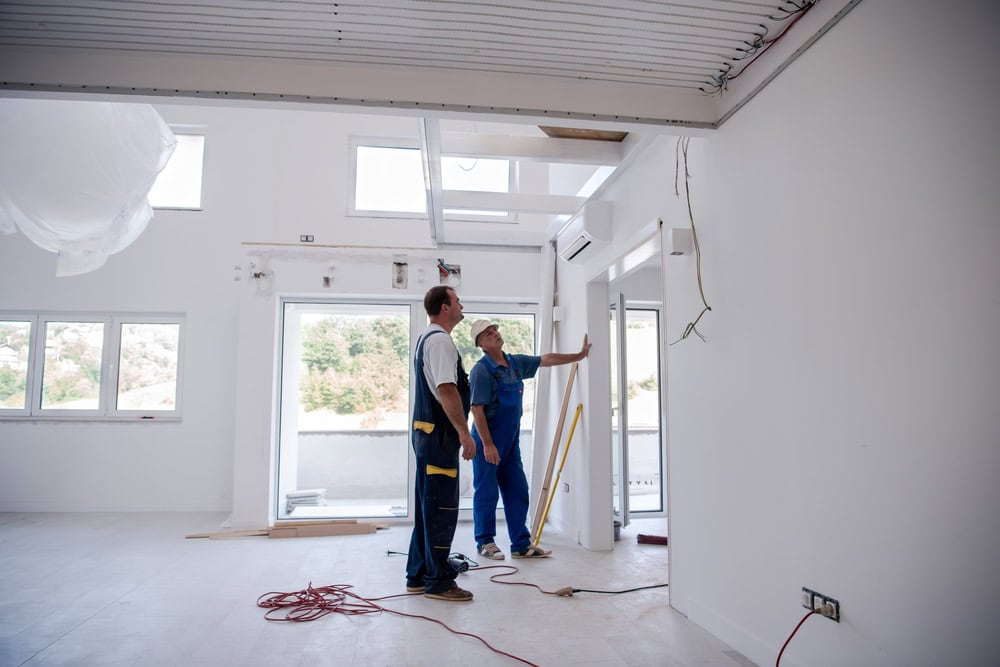If you want to sell an inherited property, you should follow a few rules and know the relevant legal and tax principles. First of all, you need to calculate whether it is worth selling or using the property yourself in terms of inheritance tax. Under certain conditions, you can even take over and live in the property tax-free.
When selling, on the other hand, various costs are incurred. First of all, the value of the building or apartment must be clarified. This requires a comprehensive property valuation. At the same time, it may be necessary to discuss the matter with the other heirs and dissolve the community of heirs. All parties involved may have to pay certain taxes such as inheritance tax and speculation tax. Whether you actually have to pay these depends on the value, the tax-free amounts and the deadlines.
Before you accept the inheritance and sell the property, you should ask yourself the following questions:
- Is it worthwhile from a tax perspective to sell the inherited property or does it make more sense to use it yourself?
- Are the co-heirs prepared to sell the inherited property?
- How large is the object and what is its value? (Valuation necessary)
- How high are inheritance and speculation taxes? Does the property still fall within the tax-free allowances?
- When do I have to inform the tax office? (three months after receipt of the inheritance!)
- Is an entry in the land register necessary?
- What about the deadlines for speculation tax?
- Are all the mortgage installments already paid off and can I theoretically finance them?
- How high are the brokerage and marketing costs?
- What condition is the property in? Does it need to be renovated before the sale?
Legal basis
If you accept the inheritance, you will first be issued a certificate of inheritance by the relevant notary. This allows the name to be changed in the land register and you to be entered as the new owner of the property. If there are several heirs, they will also be entered in the land register. Things can become more complicated if the other heirs wish to sell the condominium.
If there is no will at the time of the testator’s death or if it was only issued in handwritten form, you must apply for a certificate of inheritance and then use this to obtain the change in the land register. Both of these processes are very time-consuming and can be quite costly.
Preparing the inherited property for sale
In order to upgrade the inherited property before selling it, it may make sense to carry out energy-efficient refurbishments and modernizations, repairs and renovations, depending on its condition. In addition, all personal belongings that were previously in the interior must of course be cleared out.
The following may be relevant in this context:
- Clearing out or clearing out the belongings of the previous occupant (deceased as owner or tenant)
- Call in external persons (experts or acquaintances) to inspect problems in the home
- Carry out repairs (e.g. seals on washbasins, filling holes in the walls, replacing light bulbs, new taps)
- Renovation: painting walls and ceilings, replacing outdated wallpaper
- possibly new furnishings in the bathroom and kitchen to increase the value (such investments are regularly deductible for income tax purposes. However, consult a real estate agent to find out whether such modernization will really affect the future price).
- Possibly energy modernization (here, too, the question is whether the expenditure will really pay off in the end. It is therefore advisable to consult an estate agent).
- Basic cleaning of the property

Renovations and repairs
While energy and furnishing-related modernizations do not necessarily pay off, basic renovations and repairs are always important. If you want to sell an inherited condominium, you should be able to hand it over clean and in new condition.
Anyone who comes to view the apartment will mainly look at obvious features such as the walls and ceilings. Accordingly, the first step after clearing out would be to completely renovate these areas, in particular painting and wallpapering. This measure is relatively simple and makes the property more attractive to buyers.
In addition, essential details such as the taps, toilet flushing and drains, heating and electrics are very relevant to the purchase price. Repairing these components and, above all, replacing them after many years of use should definitely be part of the preparation for the sale.
The sales process - a step-by-step overview
Before you can sell your inherited property, you must first register it in the land register. Then contact an estate agent and clarify what preparations are necessary to achieve an attractive selling price. A professional estate agent will also be able to tell you whether certain energy-efficient modernizations are really worthwhile.
In this context, you will also receive a professional valuation of the property. On this basis, an official exposé is then prepared and published by the estate agent. As soon as an interested party contacts us, a viewing appointment is arranged. If an interested party makes a positive purchase decision, a purchase price is agreed and a contract is drawn up. The latter is usually handled by a notary. Although this is not mandatory, in practice it is usually the buyer who chooses the notary.
Next, the contract is carefully checked again by the notary and signed in his presence, with the seller and buyer presenting their identification documents and tax identification numbers. You will also present the energy performance certificate and other documents. The purchase price is then transferred and the buyer is entered in the land register as the new owner.
Here’s how to sell inherited property step by step:
- Prove inheritance and be entered in the land register as the new owner
- Find and commission a broker
- Have your property valued by an estate agent
- If necessary, carry out renovations to increase the value of the property
- Set offer price
- Compile documents for the sale
- Create an exposé with professional photos
- Publish and advertise your offer
- Carry out a tour for interested parties
- Select a buyer and check their creditworthiness
- Draw up a purchase contract and arrange a notary appointment for the property sale
- Handing over the keys to the property and requesting a change to the land register entry
Dealing with rented properties in the event of inheritance
It is not uncommon for an apartment to be inherited with a tenant already living in it. This tenant still has a right to remain living in the apartment. Accordingly, you need to make special considerations if you want to sell an inherited rented apartment.
As far as the tenant is concerned, you must adhere to the principle that the purchase does not break the tenancy. With the entry in the land register, you automatically become the new landlord with all rights and obligations. If the tenancy agreement is for an indefinite period, it may not simply be terminated without cause. However, it is generally possible to terminate the tenancy agreement for personal use, but this must meet certain legal requirements.
Tax aspects
Depending on whether you move into the property yourself or sell it, different tax obligations apply. If you have inherited the house or condominium and want to sell it, you will always have to pay inheritance tax. If you want to get rid of the property as quickly as possible, you will often also have to pay speculation tax. This is because the speculation period, which is ten years from the original purchase of the property, always applies. In such cases, it may therefore be worth waiting a few more years.

Inheritance tax and allowances
Inheritance tax is generally payable on inheritance, but the amount varies depending on the degree of relationship. You can use individual tax allowances to reduce the tax. You should inform the tax office no later than three months after you learn of the inheritance due to the obligation to notify.
The tax-free amounts are relatively accommodating, especially if the deceased is a close relative. Spouses and life partners inherit up to 500,000 euros tax-free, while a limit of 400,000 euros applies for children and 200,000 euros for grandchildren.
The allowances at a glance:
- Spouses/life partners: 500,000 euros
- Children (including stepchildren and adopted children as well as grandchildren without parents): 400,000 euros
- Grandchildren: 200,000 euros
- Parents/grandparents: 100,000 euros
- Step-parents: 20,000 euros
- Siblings and nephews/nieces: 20,000 euros
- All other heirs: 20,000 euros
If the property does not exceed these amounts in market value (as determined by the tax office) together with the rest of the inheritance, you do not have to pay any of your inheritance to the tax authorities. Even if you sell the inherited property, the tax payable will be 0 euros. The same applies if the deceased lived in the property themselves and you live there as a descendant/life partner for a further ten years before selling the property.
In this case, however, the living space must not exceed 200 square meters. Otherwise, only the excess square meters will be taxed. In addition to the inheritance tax allowance, as a child or partner you have a pension allowance, which is intended to ensure your financial provision. This amount is 256,000 euros for married couples and varies according to age from 10,300 euros (20 to 27-year-olds) to 52,000 euros (0 to 5-year-olds) for children.
Once the tax-free amounts have been exhausted, you need to look at which inheritance tax category you fall into. Spouses, children, grandchildren, parents and grandparents are always in category I and are taxed at a relatively low rate of seven percent for an inheritance of less than 75,000 euros. Siblings, nieces/nephews, step-parents, parents-in-law, children-in-law, cousins (tax class II) pay more than twice as much at 15 percent and all other heirs (tax class III) even pay 30 percent.
Houses and apartments will usually easily exceed the value of 75,000 euros. Accordingly, you should look at the following rates when planning the sale of inherited property.
Inheritance tax according to tax classes pursuant to Section 19 ErbStG (as at: March 2024)
Value of the inheritance | Tax class I | Tax class II | Tax class III |
up to 75,000 euros | 7 percent | 15 percent | 30 percent |
up to 300,000 euros | 11 percent | 20 percent | 30 percent |
up to 600,000 euros | 15 percent | 25 percent | 30 percent |
up to 6 million euros | 19 percent | 30 percent | 30 percent |
up to 13 million euros | 23 percent | 35 percent | 50 percent |
up to 26 million euros | 27 percent | 40 percent | 50 percent |
over 26 million euros | 30 percent | 43 percent | 50 percent |
Tip: The tax office determines the value of the property based on average prices in the respective area. Therefore, the assessed market value may differ from the sales price. It makes sense to consult external experts if you assume that the value of the house on the market is lower. If this is indeed the case, you can lodge an objection and obtain a reduction in your inheritance tax levy.
Generally, no inheritance tax is payable if the deceased lived in the property, the spouse/partner or children lived there for a further ten years and only then sold it. The prerequisite is that the property is smaller than 200 square meters. Otherwise, the excess square meters will be taxed on a pro rata basis.
Speculation tax
If you sell an inherited apartment quickly, the aforementioned speculation tax will regularly apply. It can therefore be worthwhile to be aware of the deadlines first. Under certain circumstances, it may be advantageous to remain the owner of the property for a few more years or to live in it yourself. This also applies to tax considerations with regard to inheritance tax.
In accordance with Section 23 of the Income Tax Act (EStG), speculation tax applies to private sales transactions and primarily affects properties that are sold within a period of ten years after the acquisition of ownership. You always pay speculation tax on inherited apartments if the purchase by the deceased was less than ten years ago at the time of sale and the property was not occupied by the deceased.
However, if the ten years have expired, you can sell the inherited apartment without paying tax on speculation. However, if speculation tax is due, it will only be applied to the increase in value, i.e. the difference between the purchase price and the current sale price. You can also deduct all estate agent and notary costs.
Your profit from the sale of the property is added to your annual gross income by the tax office and the amount is then assessed according to your individual tax rate. For example, if you have an annual income of 50,000 euros and you receive a further 100,000 euros from the sale of the property, your taxable income will rise to 150,000 euros.
Example of the sale of an inherited property with speculation tax and inheritance tax: The heir is the 25-year-old grandson with an annual gross income of EUR 50,000 who wants to sell the property immediately, which the grandmother did not live in herself but had rented out. His own parents are still alive, which is why the inheritance tax allowance is EUR 200,000 and the pension allowance is EUR 10,300:
Basic financial data:
- Original purchase price of the property = 400,000 euros
- Market value determined by the tax office = 700,000 euros
- further inheritance = 25,000 euros
- Actual sales value = 750,000 euros
- Renovation costs = 20,000 euros
Calculation of speculation tax:
- Profit from the sale of real estate = 750,000 euros – 400,000 euros – 20,000 euros = 330,000 euros
- Annual gross income = 50,000 euros
- Individual income tax rate = 40 percent
- Speculation tax = 330,000 euros x 0.4 = 132,000 euros
Calculation of inheritance tax:
- Total inheritance = 700,000 euros + 25,000 euros = 725,000 euros
- Inheritance tax allowance = 200,000 euros
- Pension allowance = 10,300 euros
- Amount taxable under the ErbStG = EUR 725,000 – EUR 200,000 – EUR 10,300 = EUR 514,700
- Tax class I up to 600,000 euros = 15 percent
- Inheritance tax = 514,700 x 0.15 = 77,205 euros
No speculation tax is payable on the sale of the inherited apartment in the following cases:
- if the testator himself lived in the property for at least the year of the sale and the two preceding years;
- if you (or your child rent-free) have lived in the property for at least the year of the sale and the two preceding years;
- if the inherited rented property was purchased by the testator more than ten years ago;
- if the profit from the sale of the inherited property is less than 600 euros.

Next steps after the sale
When selling an inherited property, other costs and fees may be incurred in addition to taxes. However, some of these are usually borne by the buyer. Once the transfer of ownership of the property has been completed, deregister various utility services such as gas, water and electricity so that the new owner can conclude their own contracts.
Once these formalities have been completed, you can think about how to invest the money you have taken in profitably. In view of low interest rates and high inflation rates, it is not advisable to simply leave it in your account. It may therefore make more sense to invest the money, for example in a new property. The disadvantage of this is that the liquid funds are tied up again and cannot be used immediately for other expenses.
An alternative would be to invest in the equity or ETF market. In the long term, there is a better chance of growth here compared to savings. However, such investments also require a certain amount of experience. In this respect, you should definitely seek detailed advice. However, if you invest wisely, you can generate passive income for your future.
FAQ: Frequently asked questions about the sale of inherited property
What taxes are payable on the sale of an inherited property?
If you wish to sell an inherited home, you will have to pay tax on the inheritance and possibly on the speculation. Inheritance tax is subject to higher or lower allowances depending on the degree of kinship. Speculation tax always applies if the deceased did not live in the apartment. In this case, a period of ten years must be observed to avoid having to pay speculation tax.
When should I sell an inherited condominium?
Selling immediately after the entry in the land register is not ideal in many cases. If you wait until ten years after the original purchase, you will save yourself speculation tax. If the deceased has already lived in the property and the heirs live there for another ten years, inheritance tax is also waived.
What tasks does the estate agent take on when selling inherited property?
A good estate agent should determine the value of the inherited property, then prepare an exposé and publish it widely. As soon as a buyer comes forward, the estate agent organizes the viewing. They will also draft the purchase contract if the parties reach an agreement. However, the contract is then signed in the presence of a notary.



